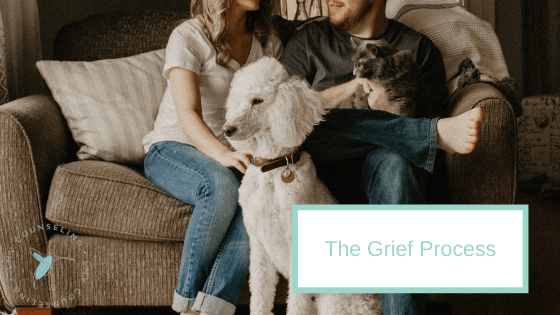The Grief Process
Most everyone has heard of the Kubler-Ross five stages of grief:
- Denial/shock
- Anger
- Bargaining
- Depression
- Acceptance
However, these stages are often not applicable or even accurate for a person’s grieving process. Stages are a nice way to package understanding of loss and normalize expectations of grief. Humans love to make patterns out of chaos. There is nothing nice or normal about grief. It’s messy and painful and unpredictable. Each person’s experience is unique.
Below we explore commonalities among most types of loss.
Denial, or resistance, can be helpful
The first stage in the Kubler-Ross model is denial. The term denial is a little old school. We now acknowledge this as resistance to change or shock. The resistance, or denial, can be helpful for daily functioning. After experiencing a loss, our brains and body may not be ready to handle the emotional pain that loss creates. It has created a buffer to provide a small dose of grief, instead of a flooding of emotional pain. This does not mean you will not experience a flood of emotional pain. It is simply an initial protective factor.
You may find that over time, even when the initial shock has worn off, that you continue to feel this resistance to the full acceptance of the loss. Often times clients will say, “I thought I was okay until I heard a song come on the radio that reminded me of my [loved one].” This is another small dose of grief that your brain is providing. It’s helping you to slowly address the psychological trauma.

Your belief system will be changed
The psychological trauma of grief and loss shake you to your core. Literally, your core beliefs will be changed. Core beliefs are the truths we have come to develop about ourselves and the world around us. Our world may never be the same again and we may wonder if we will ever be the same.
Common questions while processing grief:
“How could this have happened?”
“He/she/they didn’t deserve this.”
“Why her/him/they? Why not me?”
“He/she/they was a good person. How could this have happened?”
Underlying these questions is a core belief that many of us have been taught from a young age. It is the idea that good things happen to good people. On some level we adopt this into our psyche. Religions and spirituality perspectives adopt this as well- whether it be karma or punishment in the afterlife. However, we don’t reject this notion until it is challenged. Life usually isn’t fair and bad things happen to good people daily.
The loss of a loved one challenges this idea. Once this old belief system is
disrupted, often we’re trying to figure out a new belief and leaves us feeling guilty. We look for blame or responsibility. Some people may get angry. Some may bargain with their higher power. However, death has many causes that are not anyone’s fault. It can be a series of physical and/or mental causes. Death is not fair. Death is not unfair. Death is a part of life, a reality we must all face.
You will feel emotional pain when you least expect it
Grief is a process that eventually leads to acceptance. The painful emotions that a person experiences after a death do subside. For many the feelings of loss, loneliness and sadness will feel less intense. They become more manageable and a part of daily living. However, sometimes that grief may come in waves. You feel it building and it crashes, taking your mind and body. It feels intense and overwhelming. The waves then washes up to the shore and slowly return to the sea. Your emotions will follow the same pattern. A build up, crest, crash, and subside. It is in the natural rhythm of life.
During these times, reassure yourself, “this is normal and this feeling will not last forever.” It won’t. The intensity of that emotion cannot last forever. Reengage in your supports and activities that calm and comfort your mind and body.

There is no right way to process grief. It’s hard and it is a natural part of life. If you or someone you love is having a difficult time processing a loss, reach out. Our trusted grief and loss specialist, Catherine Ladd, can help. Get started now.
Want to know more? Other articles you might like:



